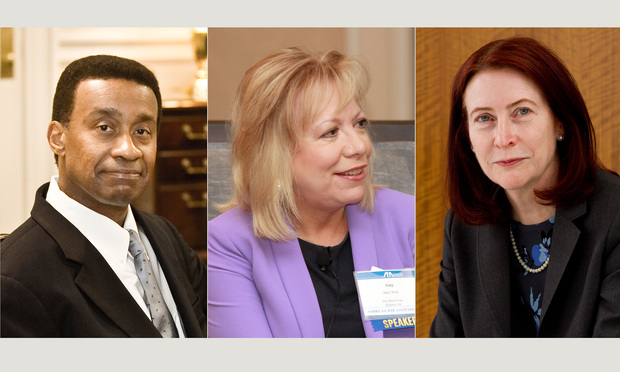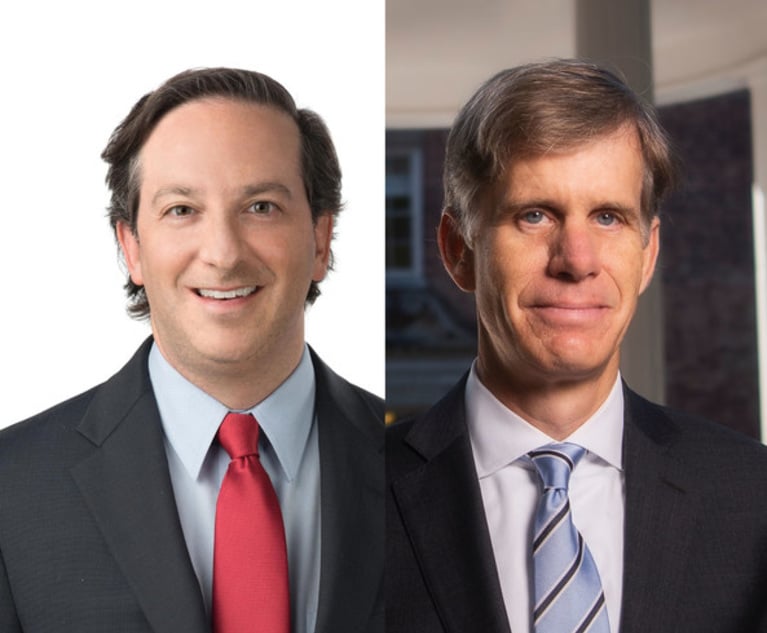Lawyers Are Phoning In for Oral Arguments. Here's How One Federal Judge Thinks It's Going
Judge Charles Wilson of the U.S. Court of Appeals for the Eleventh Circuit reflects on the first time in the circuit's history that oral arguments were conducted by telephone, while lawyers, judges and their staffs were forced to shelter in place because of COVID-19.
April 17, 2020 at 02:51 PM
6 minute read
 Judge Charles Wilson (from left) and attorneys Amy Weil and Laurie Webb Daniel.
Judge Charles Wilson (from left) and attorneys Amy Weil and Laurie Webb Daniel.
For once, Judge Charles Wilson and his law clerks didn't have to make an overnight trip from Florida to Georgia to hear oral arguments on the U.S. Eleventh Circuit Court of Appeals' Atlanta docket.
Instead, Wilson dialed in from the comfort of his Tampa chambers, joined remotely by judicial colleagues—sheltering in place in Atlanta, Macon and Miami—and lawyers from across the country, who opted to experiment for the first time in the Eleventh Circuit's history with delivering oral arguments by telephone.
Wilson said afterwards that the audio-only arguments—eight of them over four days—were "highly successful" with only "one minor misstep." The judge said he had opened one session before the courtroom deputy, who was patched in on a separate line, could formally call the court to order with the traditional "Oyez, oyez."
"It was not his mistake; it was my mistake," Wilson said. "Otherwise, there were absolutely no glitches."
And, he added, "I guess the parties were able to save money as well, because the lawyers didn't have to travel."
What Lawyers Are Saying
- Attorney Amy Weil of Atlanta's The Weil Firm: "It was a lot better than I thought it would be," and that the court and staff "made it so easy." Weil said the remote arguments allowed her to have her computer and do research during the argument, "which I thought was fabulous." She said she hopes it will remain an option that will permit judges to swap travel time for holding more oral arguments instead. "If I had to balance getting more opportunities for oral argument because … the judges don't have to travel, I would swap out it having to be in person."
- Attorney Laurie Webb Daniel of the Atlanta offices of Holland & Knight: "I hope it's not permanent." Daniel said her presentation included "intense legal argument" on a case of first impression. The veteran appellate lawyer said the inability to read the judges' facial expressions was a handicap. "There are a lot of nonverbal cues you get when you are arguing. … You have to look the judges in the eye."
- Page Pate of Atlanta's Pate, Johnson & Church: Pate opted against a phoned-in oral argument. "I didn't see a lot of value in telephone arguments, as good as I think my advocacy is," he said. "I don't think you can have an effective give-and-take with the [appellate] panel in that setting."
Wilson was reflecting on the Eleventh Circuit's decision to initiate oral arguments by teleconference, beginning March 31, in an extraordinary effort to keep going during a pandemic that has dramatically curtailed court functions, and shut courthouses to all but essential personnel across Georgia and the nation.
But the Eleventh Circuit judge's experience differed markedly from that of judges on the U.S. Court of Appeals for the D.C. Circuit after that court, too, decided to hear oral arguments only by phone. Judges there initially struggled with technical issues as some were dropped from the call, lost audio, were temporarily locked out, or plagued with "weird noises," prompting Judge Thomas Griffith to call the effort, "kind of a mess."
The U.S. Supreme Court announced on April 13 that it will follow suit, scheduling six days of arguments by teleconference in select cases next month.
Wilson called the Eleventh Circuit's remote arguments "very convenient." Yet, he hesitated in giving the interim procedure his permanent stamp of approval. "I personally prefer a face-to-face conversation with the lawyers," he said. On a telephone call, "I am unable to see lawyers' nonverbal reactions to a question."
The judge said those nonverbal cues help him to decide "whether I like his or her answer to the question."
No videoconferences for oral arguments
Wilson said that, while his appellate panels the first week the court embarked on holding oral arguments remotely, he opted against videoconferencing. "I can probably say with some authority you aren't going to see videoconferences of oral arguments in the Eleventh Circuit any time soon," he reflected. "It's just a comfort level with members of the judiciary."
Wilson also said he prefers "the formality of courtroom arguments with judges on the bench in their robes."
"I think it lends itself to a more respectful proceeding," he said. "The important thing is that we were able to maintain the continuity of court operations without having to postpone arguments or have cases decided on the basis of briefs alone. It was important that the public have confidence in the court, that we can continue to operate and function even in a challenging environment like this one."
Wilson said oral arguments by teleconference will likely continue as long as the pandemic prevents judges from traveling from their home states to hold court. But, he added, "When it's over, I suspect we are going to go back to our regular procedures."
The beginning of phoned-in oral arguments also marked the first time that the Eleventh Circuit has live-streamed audio of those arguments. "I personally don't have an argument with live-streaming arguments in real time," he said. "That's a decision the court will have to decide collectively. You might get different views on that."
Wilson, who listened to the arguments from his Tampa chambers while his law clerks listened in via the public live-stream on YouTube, said what he missed was the ability to sit down with his fellow judges in the robing room after the arguments to go over the cases. Wilson was joined during the week by Judge Barbara Lagoa and by Senior Judges R. Lanier "Bob" Anderson and Frank Hull.
"I think when we are all in a room together … we have a more meaningful conference, because we are sitting around a table with cup of coffee going back and forth without any interruptions," he said. "I think it's important for collegiality. … The oral arguments are, for the most part, the only opportunity we have to sit in a room with one another and see one another face to face."
This content has been archived. It is available through our partners, LexisNexis® and Bloomberg Law.
To view this content, please continue to their sites.
Not a Lexis Subscriber?
Subscribe Now
Not a Bloomberg Law Subscriber?
Subscribe Now
NOT FOR REPRINT
© 2025 ALM Global, LLC, All Rights Reserved. Request academic re-use from www.copyright.com. All other uses, submit a request to [email protected]. For more information visit Asset & Logo Licensing.
You Might Like
View All

On The Move: Ex-Partner Returns to Lead Nelson Mullins Corporate Group, Burr & Forman Hires University GC as COO
5 minute read
Law Firm Sued for Telemarketing Calls to Customers on Do Not Call Registry

Evidence Explained: Prevailing Attorney Outlines Successful Defense in Inmate Death Case
Law Firms Mentioned
Trending Stories
- 1OCR Issues 'Dear Colleagues' Letter Regarding AI in Medicine
- 2Corporate Litigator Joins BakerHostetler From Fish & Richardson
- 3E-Discovery Provider Casepoint Merges With Government Software Company OPEXUS
- 4How I Made Partner: 'Focus on Being the Best Advocate for Clients,' Says Lauren Reichardt of Cooley
- 5People in the News—Jan. 27, 2025—Barley Snyder
Who Got The Work
J. Brugh Lower of Gibbons has entered an appearance for industrial equipment supplier Devco Corporation in a pending trademark infringement lawsuit. The suit, accusing the defendant of selling knock-off Graco products, was filed Dec. 18 in New Jersey District Court by Rivkin Radler on behalf of Graco Inc. and Graco Minnesota. The case, assigned to U.S. District Judge Zahid N. Quraishi, is 3:24-cv-11294, Graco Inc. et al v. Devco Corporation.
Who Got The Work
Rebecca Maller-Stein and Kent A. Yalowitz of Arnold & Porter Kaye Scholer have entered their appearances for Hanaco Venture Capital and its executives, Lior Prosor and David Frankel, in a pending securities lawsuit. The action, filed on Dec. 24 in New York Southern District Court by Zell, Aron & Co. on behalf of Goldeneye Advisors, accuses the defendants of negligently and fraudulently managing the plaintiff's $1 million investment. The case, assigned to U.S. District Judge Vernon S. Broderick, is 1:24-cv-09918, Goldeneye Advisors, LLC v. Hanaco Venture Capital, Ltd. et al.
Who Got The Work
Attorneys from A&O Shearman has stepped in as defense counsel for Toronto-Dominion Bank and other defendants in a pending securities class action. The suit, filed Dec. 11 in New York Southern District Court by Bleichmar Fonti & Auld, accuses the defendants of concealing the bank's 'pervasive' deficiencies in regards to its compliance with the Bank Secrecy Act and the quality of its anti-money laundering controls. The case, assigned to U.S. District Judge Arun Subramanian, is 1:24-cv-09445, Gonzalez v. The Toronto-Dominion Bank et al.
Who Got The Work
Crown Castle International, a Pennsylvania company providing shared communications infrastructure, has turned to Luke D. Wolf of Gordon Rees Scully Mansukhani to fend off a pending breach-of-contract lawsuit. The court action, filed Nov. 25 in Michigan Eastern District Court by Hooper Hathaway PC on behalf of The Town Residences LLC, accuses Crown Castle of failing to transfer approximately $30,000 in utility payments from T-Mobile in breach of a roof-top lease and assignment agreement. The case, assigned to U.S. District Judge Susan K. Declercq, is 2:24-cv-13131, The Town Residences LLC v. T-Mobile US, Inc. et al.
Who Got The Work
Wilfred P. Coronato and Daniel M. Schwartz of McCarter & English have stepped in as defense counsel to Electrolux Home Products Inc. in a pending product liability lawsuit. The court action, filed Nov. 26 in New York Eastern District Court by Poulos Lopiccolo PC and Nagel Rice LLP on behalf of David Stern, alleges that the defendant's refrigerators’ drawers and shelving repeatedly break and fall apart within months after purchase. The case, assigned to U.S. District Judge Joan M. Azrack, is 2:24-cv-08204, Stern v. Electrolux Home Products, Inc.
Featured Firms
Law Offices of Gary Martin Hays & Associates, P.C.
(470) 294-1674
Law Offices of Mark E. Salomone
(857) 444-6468
Smith & Hassler
(713) 739-1250






